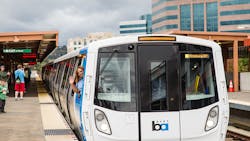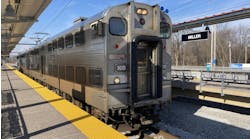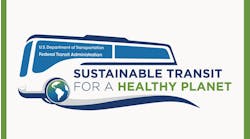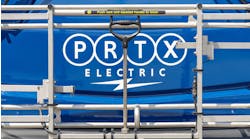Long planned transit and rail projects in California received a financial boost on April 21 with the awarding of $500 million from the California State Transportation Agency for 17 recipients in the Transit and Intercity Rail Capital Program (TIRCP).
The $500 million will support the purchase of new electric transit buses and new light-rail vehicles, expand service, facility construction and more.
The state explained funding for these projects will be provided for their design and construction and is complemented by investments of federal, local and other state funds. In total, the projects receiving funding leveraged more than $4.9 billion in additional investment.
“The $500 million in grant awards made today will increase transit service on new and existing routes, provide for a more integrated transit system, reduce greenhouse gas emissions and support jobs,” said California State Transportation Agency Secretary David S. Kim. “Although the current COVID-19 pandemic is putting tremendous stress on transit agencies, these funds support long-term capital projects to be completed in the years to come and will help support the economic recovery in the years ahead.”
TIRCP funding is provided through the Road Repair and Accountability Act of 2017 (SB 1) and from the Cap and Trade program proceeds. The funded projects will provide significant benefits to Californians through expanded transit and rail offerings that are faster, more frequent and more reliable. The program also supports the state’s climate and air quality goals, with a total reduction of five million tons of greenhouse gas emissions.
The largest grant of $107.1 million went to Bay Area Rapid Transit (BART) for vehicle acquisition associated with the Transbay Corridor Core Capacity Program. The project will expand the rail car fleet to 306 with the purchase of 34 vehicles to the completion of the Core Capacity Program, allowing rail service through the Transbay tube to increase from 23 to 30 trains per hour in each direction, as well as the operation of 10-car trains on all service in peak hours.
“We are grateful to the California State Transportation Agency and State Transportation Secretary David Kim for awarding this grant, which will play a critical role in expanding the Fleet of the Future and serving the Bay Area,” said BART General Manager Bob Powers. “Though our ridership has dropped dramatically due to the coronavirus pandemic, the agency recognizes that eventually riders will return to BART and we need to add more cars to address future demand for Transbay trips.”
A similar sized award of $107 million was provided to the Los Angeles County Metropolitan Transportation Authority (LA Metro) and Southern California Regional Rail Authority (Metrolink) for the Metrolink Antelope Valley Line Capital and Service Improvements. The project will allow regular 60-minute bi-directional service on the full Metrolink Antelope Valley Line and 30-minute bi-directional service between Los Angeles Union Station and Santa Clarita.
The city of Inglewood was awarded $95.2 million for the Inglewood Transit Connector (ITC), which will construct a 1.6-mile electrically powered automated people mover system and three new stations in the city. The city says the ITC Project will complete the missing link by providing a direct transit connection from the LA Metro Crenshaw/LAX Line’s downtown Inglewood station to the city’s new housing and employment centers and sports and entertainment venues.
San Bernardino County Transportation Authority (SBCTA) and Omnitrans were awarded $15 million for the West Valley Connector Bus Rapid Transit Phase 1 & Zero-Emission Bus Initiative, which is the largest grant in this round of TIRCP funding for a bus project. The $287-million project will construct a green, state-of-the-art bus rapid transit system that will improve corridor mobility, transit efficiency and provide clean and efficient transit service connecting the cities of Pomona, Montclair, Ontario and Rancho Cucamonga. The project will provide connections to the Ontario International Airport passenger terminals from the Metrolink San Bernardino Line in Rancho Cucamonga, as well as the Riverside Line at downtown Pomona.
A complete list of projects awarded funds is available through the California State Transportation Agency’s website.




